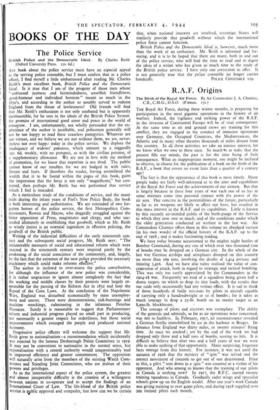The Police Service
British Police and the Democratic Ideal. By Charles Reith
(Oxford University Press. I25. 6d.) ANY book about the police service must have an especial appeal to th; serving police constable, but I must confess that as a police officer, I find myself a little embarrassed after reading Mr. Charles Reith's most excellent book, British Police and the Democratic Ideal. Is it true that I amof the progeny of those men whose "unbiassed justness and fairmindedness, unselfish friendliness, good-humour and individual heroism" meant so much in the 1830's, and according to the author so notably served to redeem England from the threat of lawlessness? Old friends will find that Mr. Reith's enthusiasm is not only unabated but is apparently inexhaustible, for he sees in the ideals of the British Police System the promise of international good sense and peace in the world of tomoirow. I am, unfortunately, not wholly persuaded that the ex uberance of the author is justifiable, and policemen generally will not be too happy to read these ceaseless panegyrics. Whatever are our virtues, and we believe we are not without them, we are, never theless not over happy today in the police service. We deplore the inadequacy of widows' pensions, which amount to a niggardly I2S. 6d. weekly, with no prospect, as with the civilian pension of a supplementary allowance. We are not in love with the method of promotion, for we know that nepotism is not dead. The public cannot know of our troubles for we are hedged in with rules, threats and fears. If therefore the reader, having assimilated the wealth that is to be found within the pages of this book, gains the impression that the force is not only "magnificent," but contented, then perhaps Mr. Reith has not performed that service which I feel is intended.
As a meticulous study of the conditions of service, and the many trials during the infant years of Peel's New Police Body, the book is both interesting and authoritative. We arc reminded of two for gotten heroes of the police service, the first Metropolitan Commissioners, Rowan and Mayne, who doggedly struggled against the bitter opposition of Press, magistrates and clergy, and who succeeded ultimately in establishing that goodwill, which as Mr. Reith so wisely insists is an essential ingredient in effective policing, the goodwill of the British public.
Writing of the industrial difficulties of the early nineteenth century and the subsequent social progress, Mr. Reich says: "The innumerable measures of social and educational reform which were enacted in the nineteenth century were inspired partly by the awakening of the social conscience of the community, and, largely, by the fact that the existence of the new police provided the necessary machinery which could make reforms •effeetive." The author is inclined to over-assess the police contribution, for although the influence of the new police was considerable, it is rather ungracious to ignore almost completely the fact that .
the working and middle classes by their protests were largely responsible for the passing of the Reform Act in 1832 and later the Repeal of the Corn Laws. At the conclusion of the Napoleonic Wars, England was disturbed economically by mass unemployment and unrest. There were demonstrations, rick-burnings and machine wreckings, culminating in the infamous Peterloo Massacre. Surely it is reasonable to suggest that Parliamentary reform and industrial progress played no small part in producing, not necessarily a greater respect for orderliness, but those social improvements which assuaged the people and prodyced national harmony.
Progressive police officers will welcome the support that Mr. Reith gives to nationalisation—a recommendation which incidentally was rejected by the famous Desborough Police Committee in 1919.
It may not be convenient to nationalise in the normal sense, but regionalisation with a central authority would unquestionably lead to improved efficiency and greater contentment The opposition will naturally arise from the members of the existing Watch Committees and Standing joint Committees, who are jealous of their Powers and privileges.
As to the international aspect of the police system, the greatest and -aknost insuperable difficulty is the creation of a willingness
between nations to co-operate and to accept the findings of an International Court of Law. The life-blood of the British police service is pjiblic approval and sympathy, but how can we be certain that, when national interests are involved, sovereign States will similarly provide that goodwill without which the international police force cannot function.
British Police and the Democratic Ideal is, however, much more than the work of an enthusiast. Mr. Reith is informed and farseeing, and it is to be hoped that there are many, both in and out of the police service, who will find the time to read and to digest the ideas of a writer who has given so much time to the study of the British police service. I have only one correction to offer. It is not generally true that the police constable no longer carries handcuffs. POLICE CONSTABLE 119.






















 Previous page
Previous page